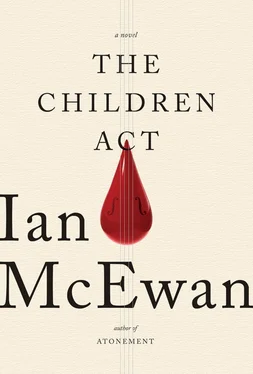At the end of October she found in the morning post at the Courts of Justice a familiar blue envelope. Pauling was in the room at the time. To conceal her feelings, a mix of excitement and vague fear, she took the letter to the window and pretended an interest in the courtyard below. When Pauling had left, she took from the envelope a single sheet of paper, folded in four, torn across the bottom, on which was an unfinished poem. Its title was in block capitals, underlined twice. “THE BALLAD OF ADAM HENRY.” The writing was small; the poem was long and ran over the page. No accompanying letter. She glanced at the first verse, failed to take it in and put it aside. She had a difficult case beginning in half an hour, a set of complicated marital claims and counterclaims that were set to absorb two weeks of her life. Both parties intended to remain exceedingly rich at the expense of the other. This was not the moment for poetry.
Two days passed before she opened the envelope again. It was ten in the evening. Jack was at another lecture on sedimentary layers, or so he said, and she preferred to believe him. She lay on her couch and spread the torn sheet on her lap. It looked to her like doggerel of the birthday card variety. Then she forced herself into a more accepting state of mind. It was a ballad, after all, and he was only eighteen.
THE BALLAD OF ADAM HENRY
I took my wooden cross and dragged it by the stream.
I was young and foolish and troubled by a dream
That penitence was folly and burdens were for fools.
But I’d been told on Sundays to live life by the rules.
The splinters cut my shoulder, that cross was heavy as lead,
My life was narrow and godly and I was almost dead,
The stream was merry and dancing and sunlight danced around,
But I must keep on walking, with eyes fixed on the ground.
Then a fish rose out of the water with rainbows on its scales.
Pearls of water were dancing and hung in silvery trails.
“Throw your cross in the water if you’re wanting to be free!”
So I drowned my load in the river in the shade of the Judas tree.
I knelt by the banks of that river in a wondrous state of bliss
While she leaned upon my shoulder and gave the sweetest kiss.
But she dived to the icy bottom where she never will be found,
And I was full of tears until I heard the trumpets sound.
And Jesus stood on the water and this he said to me,
“That fish was the voice of Satan, and you must pay the fee.
Her kiss was the kiss of Judas, her kiss betrayed my name.
May he
May he what? The last words of the final verse were lost to a skein of spidery lines that looped around second thoughts, to words deleted and reinstated and to other variants with question marks. Rather than attempt to decipher the mess, she read the poem again, then lay back with eyes closed. She minded that he was angry with her, casting her as Satan, and began to daydream a letter to him, knowing that she would never post it, or even write it. Her impulse was to appease him as well as justify herself. She summoned flat ready-made phrases. I had to send you away. It was in your own best interests. You have your own young life to lead . Then, more coherently, Even if we had the room, you could not be our lodger. Such a thing is simply not possible for a judge . She added, Adam, I’m not Judas. An old trout perhaps… This last to lighten a fierce self-justifying intent.
Her “sweetest kiss” had been reckless and she hadn’t got away with it, not where he was concerned. But it was only kindness not to send him a letter. He’d write by return, he’d be at her door and she’d have to turn him away again. She folded the sheet back into its envelope, took it to her bedroom and stored it in the drawer of her bedside table. He would soon move on. Either he had drifted back into religion, or Judas, Jesus and the rest were poetic devices to dramatize her awful behavior, kissing him, then packing him off in a taxi. Whichever it was, Adam Henry was likely to succeed brilliantly at his postponed exams and go to a good university. She would fade in his thoughts, become a minor figure in the progress of his sentimental education.
———
THEY WERE IN a small bare basement room below Mark Berner’s chambers. No one could remember how a Grotrian-Steinweg upright came to be there, no one had claimed it in twenty-five years, no one was minded to move it. There were scratches and cigarette burns on the lid, but the action was good, the tone velvety. Outside it was below freezing, with the season’s first inch of snow settling picturesquely on Gray’s Inn Square. Here, in what they called the rehearsal room, there was no radiator, but certain downpipes among an array of early Victorian plumbing fixed against one wall gave off a feeble constant heat that happened to keep the instrument in tune. The floor covering, dating from the 1960s, was strips of coffee-stained needlecord that had once been glued down on cement. Now the edges rose rebelliously. It was easy to trip. Lighting was from a dazzling 150-watt bare bulb screwed into the low ceiling. For some while Mark had mentioned getting a shade. Apart from a music stand and piano stool, the only other furniture was a frail kitchen chair, on which their coats and scarves were piled.
Fiona was sitting at the keyboard, hands clasped for warmth on her lap, gazing at the score in front of her, Les nuits d’été in an arrangement for piano and tenor voice. Somewhere in her sitting room there was an old recording on vinyl by Kiri Te Kanawa. She hadn’t seen it in years. And it wouldn’t help them now. They urgently needed to be working on it, because they’d had only two rehearsals so far. But Mark had been in court the day before and was still angry and needed to tell her why. And what he intended to do with his future, for he was leaving the law. He’d had enough. Too sad, too stupid, too wasteful of young lives. An old and empty threat, but as she sat shivering, she felt obliged to hear him out. Even so, she could not stop herself staring at the opening, the “Villanelle,” at the softly repeating chords, pulsing staccato quavers, or imagining the sweet melody, or forming her own prosaic translation of Gautier’s first line—
When the new season comes, when the cold has disappeared…
Berner’s case concerned four young men fighting outside a pub near Tower Bridge with four other young men they happened to meet. All eight had been drinking. Only the first four were arrested and charged. The jury had found them guilty of grievous bodily harm with intent and had accepted the prosecution’s argument that the men should be treated on the basis of joint enterprise, that regardless of what each one had done, they should be dealt with equally. They were all in it together. After the verdict, which was a week before sentencing, the judge at Southwark, Christopher Cranham, had advised the men that they should expect serious custodial sentences. At this stage Mark Berner was brought in by anxious relatives of one of the four, Wayne Gallagher. They’d had a whip-round among family and friends and with some clever online crowd-sourcing raised the necessary twenty thousand pounds. The hope was that a QC of repute might speak effectively in mitigation before Gallagher was sentenced. Perfectly competent legal-aid counsel was dismissed, though the instructing solicitor was kept on.
Berner’s client was a twenty-three-year-old from Dalston, a somewhat dreamy young man whose chief fault was a degree of passivity. And a failure to keep appointments. His mother was a drunk and a drug addict; the father, with similar problems, was mostly absent from Wayne’s childhood, which was one of chaos and neglect. He loved his mother and, he insisted, she loved him. She never hit him. Much of his adolescence was spent being his mother’s main carer and he missed a lot of school. He left at sixteen, worked at low-level jobs—in a chicken-plucking factory, as a laborer, in a warehouse, stuffing junk mail through letter boxes. He had never claimed unemployment or housing benefit. Five years earlier, at the age of eighteen, he was maliciously accused of rape by a girl, was held in a young offenders’ prison for a couple of weeks, then tagged and put under strict curfew conditions for six months. There was good mobile phone text evidence to prove the sex was consensual, but the police declined to investigate. They had targets to meet in rape cases. Gallagher was just their sort of man. First day of the trial, damning evidence from the accuser’s best friend caused the case to collapse. The supposed victim had been hoping for money from the Criminal Injuries Compensation Authority. She was keen on buying a new Xbox. She had texted her intentions to her friend. Prosecuting counsel was seen to hurl his wig to the floor and mutter “Stupid girl.”
Читать дальше












